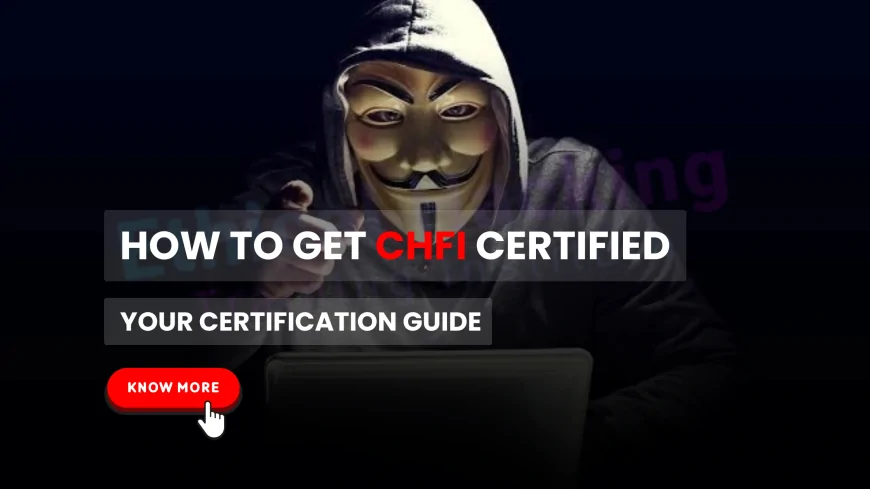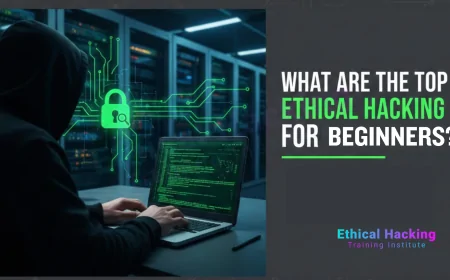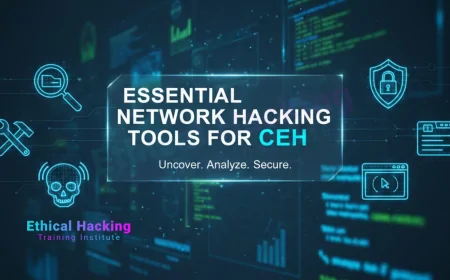How to Get Certified as a Computer Hacking Forensic Investigator (CHFI) | Becoming a CHFI: What You Need to Know to Get Certified
Learn how to become a certified Computer Hacking Forensic Investigator (CHFI) with this complete step-by-step guide. Get training tips, exam info, and more.

Table of Contents
- Introduction
- Why Get CHFI Certified?
- Prerequisites & Eligibility
- Training Options Available
- How to Choose Your Path
- Creating a Study Plan
- Hands-On Lab Practice
- Exam Registration Process
- Exam Preparation Tips
- What to Expect on Exam Day
- Strategies to Pass the Exam
- What After Passing?
- Certification Validity & Renewal
- Career Opportunities
- Salary & Market Insight
- Advancing With CHFI
- Common Challenges & Solutions
- Real World Success Stories
- FAQs
- Conclusion
Introduction
Obtaining the CHFI (Computer Hacking Forensic Investigator) certification validates your ability to investigate cybercrimes, collect digital evidence, and support legal proceedings. This guide covers everything you need—from first steps to launching your forensic career.
Why Get CHFI Certified?
- Professional Credibility: Recognized worldwide by EC‑Council and legal bodies.
- Career-Enhancing Skills: Learn forensic analysis, chain-of-custody, memory and network forensics.
- In-Demand Role: Cybercrime surge makes forensic experts essential to organizations.
- Legal Admissibility: Certification confirms your evidence handling meets court standards.
Prerequisites & Eligibility
- Basic understanding of computer systems and networks.
- Familiarity with operating systems (Windows, Linux).
- Recommended prior cybersecurity or IT experience (optional but helpful).
Training Options Available
- Self-paced online courses with lab access.
- Instructor-led virtual classes offering live Q&A.
- Intensive bootcamps (5–7 days) for fast immersion.
- Corporate enrollments with on-site training tailored to team needs.
How to Choose Your Path
- Self-paced: Best for disciplined individuals with busy schedules.
- Live instructor-led: Offers direct support and peer engagement.
- Bootcamps: Ideal for rapid learning and certification.
- Hybrid: Mix of recorded content and occasional live sessions.
Creating a Study Plan
- Map CHFI domains across weeks (evidence handling, OS forensics, network, mobile, cloud).
- Track progress using calendars and lab logs.
- Schedule regular mock exam reviews and feedback sessions.
Hands-On Lab Practice
Key lab exercises include:
- Disk imaging with write-blockers
- Registry, memory, and malware analysis
- Network packet reconstruction and email extraction
- Chain-of-custody documentation and forensic report writing
Exam Registration Process
- Create an EC‑Council iClass account.
- Buy standalone voucher or bundled training usally including voucher.
- Schedule your proctored exam—choose online or in-person center.
- Read and sign the candidate agreement.
Exam Preparation Tips
- Take full-length mock tests to build endurance.
- Flashcards for critical tools, hashes, OS artifacts.
- Join forums (e.g., DFIR Reddit) for peer insights.
- Review areas of weakness and revisit labs.
What to Expect on Exam Day
- 4 hours to answer 150 multiple-choice questions.
- No negative marking—attempt every question.
- Needs webcam, ID, silent environment for online proctored exams.
Strategies to Pass the Exam
- Read carefully—terms like imaging vs cloning matter.
- Use process of elimination for tough questions.
- Skip and return to save time on lengthy questions.
- Stay calm—take short breaks for stamina management.
What After Passing?
- Receive digital badge and certificate from EC-Council.
- Update LinkedIn, resume, and professional profiles.
- Access EC‑Council alumni forums and online communities.
Certification Validity & Renewal
- Certified for 3 years from the date of passing.
- Renew by earning EC‑Council CPE credits or retaking the exam.
Career Opportunities
- Digital Forensics Analyst
- Incident Response Specialist
- eDiscovery Consultant
- Cybercrime Investigator
- Malware Analyst
Salary & Market Insight
Average salaries for CHFI roles:
- India: ₹6–15 LPA
- Global: $70K–$120K+
- Experienced or certified pros can earn $150K+
Advancing With CHFI
- Pair with CEH, GCFA, or OSCP for defense/offense combo.
- Pursue roles in DFIR leadership.
- Contribute to research, forensic tools, or community knowledge.
Common Challenges & Solutions
- Too much theory? Focus on labs and evidence practice.
- Stressful exam? Use mock drills under timed conditions.
- Lab access issues? Opt for providers offering extended access.
Real World Success Stories
“I passed CHFI while working full‑time—landed a role in a cybercrime unit.” – Ravi, Pune
“My bootcamp made me confident to lead forensic investigations.” – Ayesha, Bangalore
FAQs -
1. What does CHFI certification cover?
CHFI covers forensic analysis across disk, memory, network, mobile, and cloud environments, including legal documentation.
2. How much does the CHFI exam cost?
Prices vary: standalone voucher is $500–600 USD; bundled with training it may cost $1,800–4,000 USD.
3. Can beginners start CHFI?
Yes—basic IT and cybersecurity knowledge is helpful, but structured labs and training support beginners well.
4. Is lab practice mandatory?
Absolutely—hands-on practice is essential for passing the exam and real-world preparedness.
5. What tools will I use?
Core tools include EnCase, FTK, Volatility, Autopsy, Wireshark, Cellebrite.
6. Where can I take the exam?
Online via remote proctor or at authorized exam centers.
7. How long is CHFI valid?
Certification lasts 3 years and requires renewal via credits or re-exam.
8. Is there negative marking?
No—you can attempt every question without penalty.
9. How can I prepare effectively?
Use lab-heavy training, mock exams, flashcards, community support, and time-based drills.
10. Can I retake if I fail?
Yes—vendors often offer one retake; policies vary per provider.
11. Is CHFI recognized globally?
Yes—widely accepted by governments, law firms, corporate security teams, and forensic agencies.
12. What job roles follow CHFI?
You can become a forensic analyst, incident responder, eDiscovery consultant, or malware investigator.
13. Can CHFI lead to court testimony roles?
Yes—training includes evidence documentation suitable for legal proceedings and court presentation.
14. Is CHFI easy or hard?
It's challenging but achievable with proper study, labs, and exam strategy.
15. How do I maintain certification?
Earn EC-Council CPE credits or retake exam every 3 years.
16. Can this boost my salary?
Yes—CHFI-certified professionals often see salary increases of 20–40%.
17. Should I combine CHFI with another cert?
Pairing it with CEH strengthen both forensic and offensive skills; adding OSCP or GCFA deepens technical depth.
18. Are student discounts available?
Many vendors offer student pricing and installment plans—check local providers.
19. How long does the course take?
Bootcamps: 5–7 days; online/self-paced: 4–12 weeks depending on study hours.
20. How do I choose a good provider?
Select an EC-Council authorized training center with strong lab environment, expert instructors, and good pass rates.
Conclusion
Getting your CHFI certification involves planning, dedication, and lab-based practice. With the right path—online, bootcamp, or hybrid—and support, you can enter cyber forensics confidently. It’s a valuable credential that accelerates your career and positions you at the heart of cybercrime defense.
What's Your Reaction?
 Like
0
Like
0
 Dislike
0
Dislike
0
 Love
0
Love
0
 Funny
0
Funny
0
 Angry
0
Angry
0
 Sad
0
Sad
0
 Wow
0
Wow
0

















